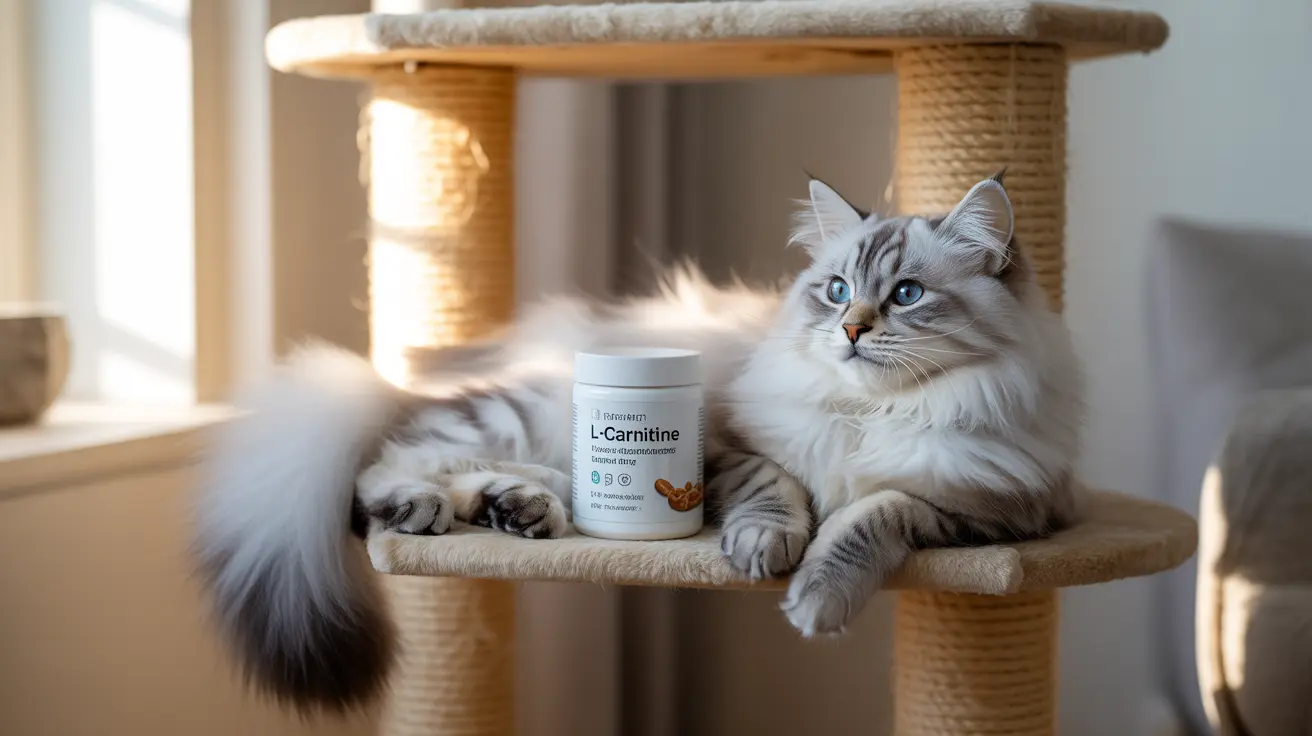L-carnitine plays a crucial role in feline health, serving as a vital compound that supports everything from heart function to energy production. For cat owners looking to optimize their pet's health, understanding the benefits of L-carnitine supplementation can be game-changing.
In this comprehensive guide, we'll explore how L-carnitine benefits cats, particularly in supporting heart health, managing weight, and boosting energy levels. We'll also discuss signs of deficiency and proper supplementation guidelines to help your feline friend thrive.
Understanding L-Carnitine's Role in Feline Health
L-carnitine is an amino acid-derived compound that acts as a cellular transport system for fatty acids. In cats, it's particularly important because it helps convert fat into energy within the cells' mitochondria. This process is essential for maintaining healthy organ function, especially in the heart and muscles.
While cats naturally produce L-carnitine, certain conditions or life stages may require supplementation to maintain optimal health. Senior cats, overweight felines, and those with heart conditions often benefit most from additional L-carnitine support.
Heart Health Benefits
One of the most significant benefits of L-carnitine for cats is its impact on cardiac health. The heart muscle relies heavily on fatty acids for energy, and L-carnitine ensures efficient energy production for this vital organ. Research has shown that L-carnitine supplementation can help strengthen the heart muscle and improve cardiac function.
Cats diagnosed with dilated cardiomyopathy (DCM) or other heart conditions may show particular improvement with L-carnitine supplementation when combined with traditional veterinary care.
Weight Management and Metabolic Support
L-carnitine plays a crucial role in helping cats maintain a healthy weight. By facilitating fat metabolism, it helps:
- Convert stored fat into usable energy
- Preserve lean muscle mass during weight loss
- Support healthy metabolic function
- Prevent hepatic lipidosis during weight loss
Energy Production and Muscle Function
Beyond heart health and weight management, L-carnitine significantly impacts overall energy levels and muscle function. Active cats and senior felines particularly benefit from its ability to:
- Enhance cellular energy production
- Support muscle recovery after exercise
- Maintain muscle strength and function
- Reduce fatigue during physical activity
Signs of L-Carnitine Deficiency
Recognizing potential L-carnitine deficiency is crucial for proper intervention. Common signs include:
- Unexplained weight gain
- Decreased energy levels
- Muscle weakness
- Poor exercise tolerance
- Cardiac issues in severe cases
Safe Supplementation Guidelines
When considering L-carnitine supplementation for your cat, follow these important guidelines:
- Always consult with your veterinarian before starting supplementation
- Choose high-quality supplements specifically formulated for cats
- Follow recommended dosage instructions carefully
- Monitor your cat's response to supplementation
- Maintain regular veterinary check-ups
Frequently Asked Questions
What are the benefits of L-carnitine supplementation for cats with heart disease?
L-carnitine supplementation can strengthen the heart muscle, improve cardiac function, and support overall cardiovascular health. It's particularly beneficial for cats with dilated cardiomyopathy and other heart conditions by helping the heart muscle utilize energy more efficiently.
How does L-carnitine help with weight management and fat metabolism in overweight cats?
L-carnitine aids weight management by facilitating the transport of fatty acids into cells' mitochondria for energy production. This process helps convert stored fat into usable energy while preserving lean muscle mass during weight loss programs.
What signs indicate a possible L-carnitine deficiency in cats that I should watch for?
Key signs include unexplained weight gain, lethargy, muscle weakness, poor exercise tolerance, and in some cases, heart-related symptoms. If you notice these signs, consult your veterinarian for proper evaluation.
How should I safely administer L-carnitine supplements to my cat, and what dosage is recommended?
L-carnitine supplementation should always be administered under veterinary guidance. The appropriate dosage depends on your cat's weight, age, and specific health conditions. Your vet will recommend the proper form (powder or liquid) and dosage for your cat's needs.
Can L-carnitine improve energy levels and muscle recovery in aging or less active cats?
Yes, L-carnitine can help improve energy levels and muscle function in aging or sedentary cats by enhancing cellular energy production and supporting muscle recovery. It's particularly beneficial for senior cats who may experience age-related muscle loss or decreased activity levels.
Conclusion
L-carnitine is a vital compound for feline health, offering significant benefits for heart function, weight management, and energy production. While supplementation can be beneficial, it's essential to work with your veterinarian to determine the right approach for your cat's specific needs. With proper supplementation and monitoring, L-carnitine can play a crucial role in maintaining your cat's overall health and vitality.






